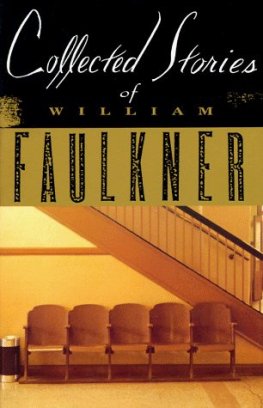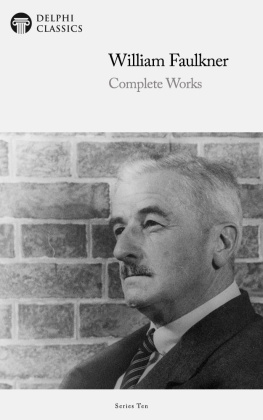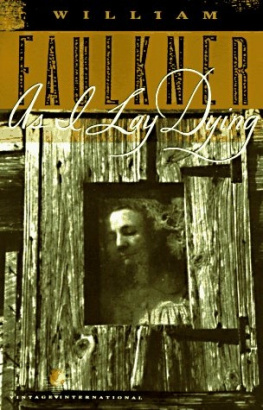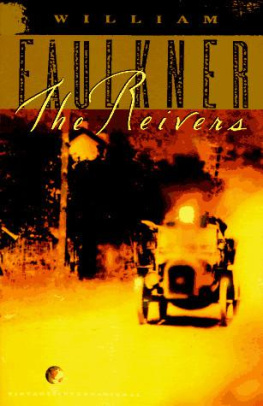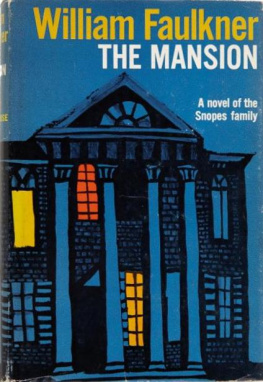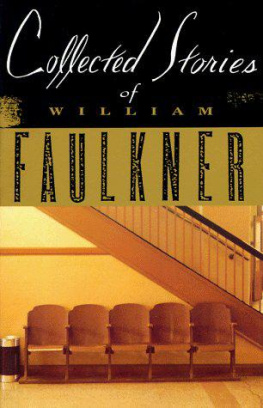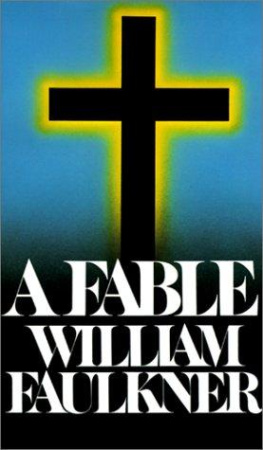Hyatt H. Waggoner - William Faulkner: From Jefferson to the World
Here you can read online Hyatt H. Waggoner - William Faulkner: From Jefferson to the World full text of the book (entire story) in english for free. Download pdf and epub, get meaning, cover and reviews about this ebook. year: 2021, publisher: UP of Kentucky, genre: Detective and thriller. Description of the work, (preface) as well as reviews are available. Best literature library LitArk.com created for fans of good reading and offers a wide selection of genres:
Romance novel
Science fiction
Adventure
Detective
Science
History
Home and family
Prose
Art
Politics
Computer
Non-fiction
Religion
Business
Children
Humor
Choose a favorite category and find really read worthwhile books. Enjoy immersion in the world of imagination, feel the emotions of the characters or learn something new for yourself, make an fascinating discovery.

- Book:William Faulkner: From Jefferson to the World
- Author:
- Publisher:UP of Kentucky
- Genre:
- Year:2021
- Rating:5 / 5
- Favourites:Add to favourites
- Your mark:
- 100
- 1
- 2
- 3
- 4
- 5
William Faulkner: From Jefferson to the World: summary, description and annotation
We offer to read an annotation, description, summary or preface (depends on what the author of the book "William Faulkner: From Jefferson to the World" wrote himself). If you haven't found the necessary information about the book — write in the comments, we will try to find it.
William Faulkner: From Jefferson to the World — read online for free the complete book (whole text) full work
Below is the text of the book, divided by pages. System saving the place of the last page read, allows you to conveniently read the book "William Faulkner: From Jefferson to the World" online for free, without having to search again every time where you left off. Put a bookmark, and you can go to the page where you finished reading at any time.
Font size:
Interval:
Bookmark:
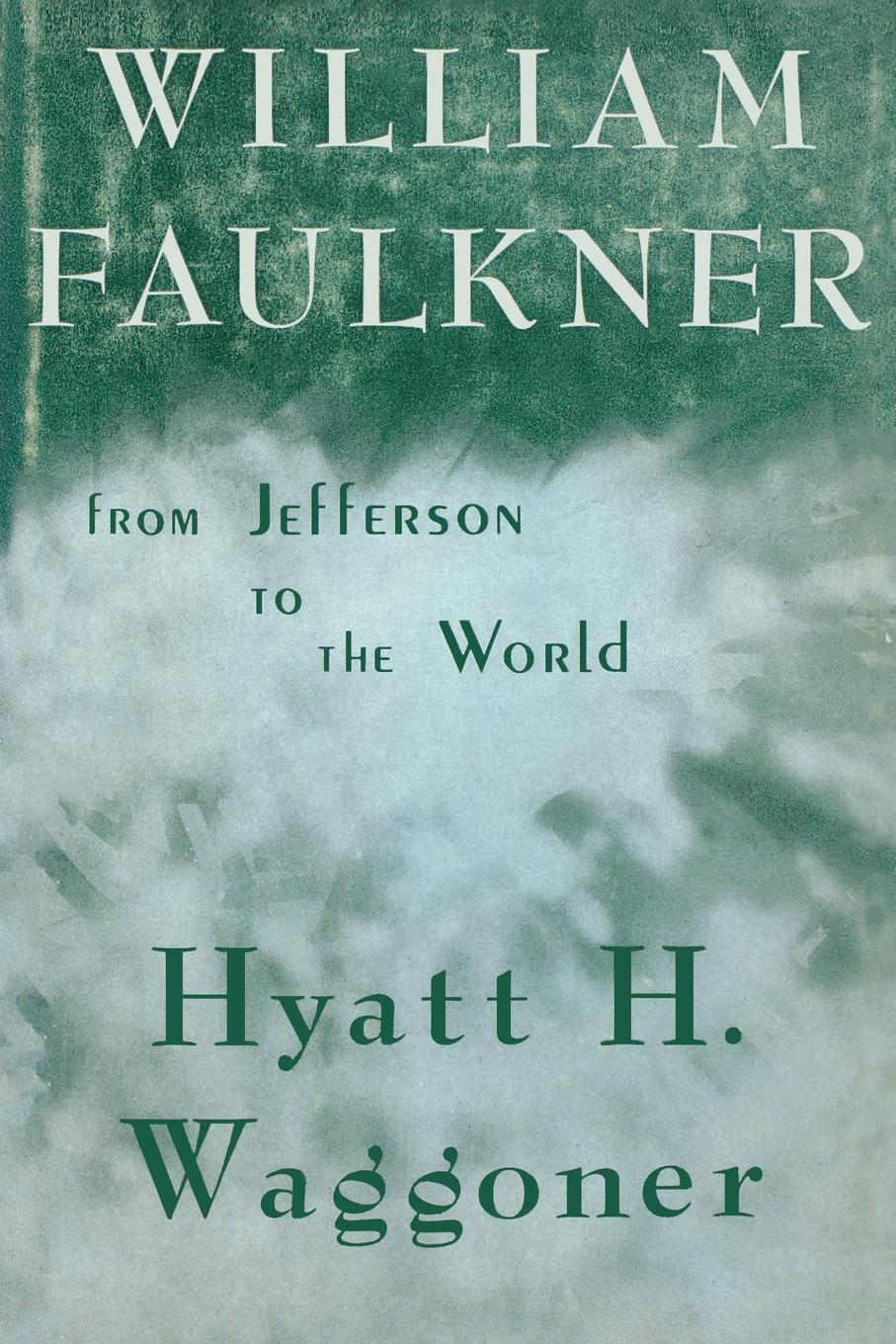
William Faulkner
HYATT H. WAGGONER
FROM JEFFERSON TO THE WORLD

COPYRIGHT 1959 by the University of Kentucky Press. Printed at the University of Kentucky. Library of Congress catalog card number: 59-13268. The publication of this book has been aided by a grant from The Ford Foundation.
ONE OF THE SIGNS of a writers greatness is that continued study of his work does not exhaust its significance for us. This book has been written from the conviction that the large body of Faulkner criticism, much of it of very high quality, has not exhausted the meanings or fully defined the values of Faulkners works. Critics have tended to concentrate their efforts on the novels that nearly everyone agrees are the greatest, to the neglect of others less great but deserving of careful study. This concentration on the high points of a career is natural enough, and proper enough too in a sense, but one of its results is that we have not yet fully perceived the outlines of Faulkners career as a whole or the unity of the whole of his work.
I have attempted to get at this largest of the unities that may be discovered in a writers work not by ignoring Faulkners writings and concentrating on large philosophical questions, or by using his works merely to illustrate generalizations about Faulkner the man, the problem of the South, or contemporary social conditions, but by looking attentively at the writings themselves, noting signs of continuity and development, and relating these to Faulkners many statements of intention. I would not argue that such a procedure is the only valid one, or even necessarily the best one, but only that it is capable of revealing some things that have remained dark.
The first ten chapters, accordingly, treat the fiction in the order of its publication, allotting to each novel a more or less extended discussion. Limitations of space made it impossible to treat the short stories in this way, but chapter nine, which interrupts the chronological presentation of the novels, attempts to relate the stories to the major themes that have emerged in the study of the novels and offers analyses of several stories taken to be representative. In the last two chapters I turn from specific works to consideration of problems common to the whole body of work, attempting first (in chapter eleven) to clarify the moral and religious implications of the fiction, concentrating on what I take to be central and determinative in Faulkners writing, his uneasy relation to his Christian background; and finally (in chapter twelve) attempting to evaluate Faulkners achievement thus far in his career.
Literary criticism is never definitive; criticism of a still living author, moreover, is exposed to special hazards of its own. The only justification for such a study as this lies in the hope that it may usefully supplement the explorations of others who have walked the same tortuous and rewarding trail.
MY INDEBTEDNESS TO the Faulkner critics who have preceded me is I hope made sufficiently clear either in the text or in the notes of this book, but I should like to note here my largest debt to any earlier criticism. The many citations of William Van OConnors The Tangled Fire of William Faulkner will suggest how thoroughly I have used it but do not in themselves make clear what seems to me to be true, that despite its brevity and its pioneering, the book will long continue to be indispensable to Faulkner students.
I am deeply indebted to a number of friends who helped at various stages of the preparation of this book. Thanks go especially to Edwina Bender and Mary Jane Nelson, who typed the first draft of the manuscript, and to W. Stacy Johnson, Roma A. King, Barry Marks, and John Gardner, who read the manuscript and made many helpful suggestions.
For permission to reprint , a version of which appeared in The Tragic Vision and Christian Faith, edited by Nathan Scott, I am indebted to the Association Press.
MOSQUITOES
ONCE FAULKNER BEGAN to get his fiction published, in the mid-twenties, he attained his artistic maturity very quickly. Only three years elapsed between Soldiers Pay and The Sound and the Fury, but in the three novels he published in those years we may trace the growth of a major artist. Soldiers Pay is a wholly immature period piece containing a few passages of lasting power. In Mosquitoes the young artist finds his own voice and declares his independence. In the final third of Sartoris there is a prolonged demonstration of the sort of writing promised in Mosquitoes, a demonstration which the obvious unevenness of the novel does not obscure. The Sound and the Fury is a novel which demands comparison with the greatest in American, or any, fiction. By 1929 Faulkner was beginning his period of most rapid and successful production.
The opening chapter of Soldiers Pay makes us think of Hemingway, to Faulkners disadvantage. The disillusioned returning soldiers, drinking to deaden their awareness of the great nothingness behind and before them, are like classroom examples of lost generation attitudes. If they are less revealing of the period than Jake Barnes and Lady Brett it is because they are not so successfully created. They tell us they are in despair, and tell us why, and the voice of the narrator underscores their explanations. Julian Lowe sits in a smoldering of disgusted sorrow, raising, now and then, a sophisticated eye. Hemingways Nick in In Our Time certainly feels both disgust and sorrow and he becomes what we might call sophisticated, but no such words will be found in any description of him. The central fact in the awareness of the characters in Soldiers Pay is not very different from the fact that shapes the sensibilities of Jake Barnes and his group in The Sun Also Rises, the one expressed in the opening story of In Our Time, or the one that shapes the conclusion of A Farewell to Arms. But the expression of the central fact in Soldiers Pay is different:
Joe, do you know hes going blind? she said abruptly.
After a time her face became a human face and holding it in his vision he said:
I know more than that. Hes going to die.
Die?
Yes, maam. If I ever seen death in a mans face, its in his. Goddam this world, he burst out suddenly.
What really emerges in this passage from Soldiers Pay is only a vivid impression of Gilligans drunkenness: we feel the effort he has to make to attend to his questioners words, to see her face, holding it in his vision. We have not yet been made to feel the emotion behind his Goddam this world. Faulkner has succeeded only intermittently in the creation of a world in the opening chapter of Soldiers Pay.
It is suggestive of the nature of Faulkners creative gift that the second chapter, laid in the small Georgia town to which some of the victims of war we met in the first chapter are returning, is so much more interesting than the first. In a very real sense, this is the beginning of the part of the novel that still lives for us as successful fiction. It begins with a striking image prefiguring a theme as apparent in The Sound and the Fury, As I Lay Dying, Requiem for a Nun, and
Font size:
Interval:
Bookmark:
Similar books «William Faulkner: From Jefferson to the World»
Look at similar books to William Faulkner: From Jefferson to the World. We have selected literature similar in name and meaning in the hope of providing readers with more options to find new, interesting, not yet read works.
Discussion, reviews of the book William Faulkner: From Jefferson to the World and just readers' own opinions. Leave your comments, write what you think about the work, its meaning or the main characters. Specify what exactly you liked and what you didn't like, and why you think so.

